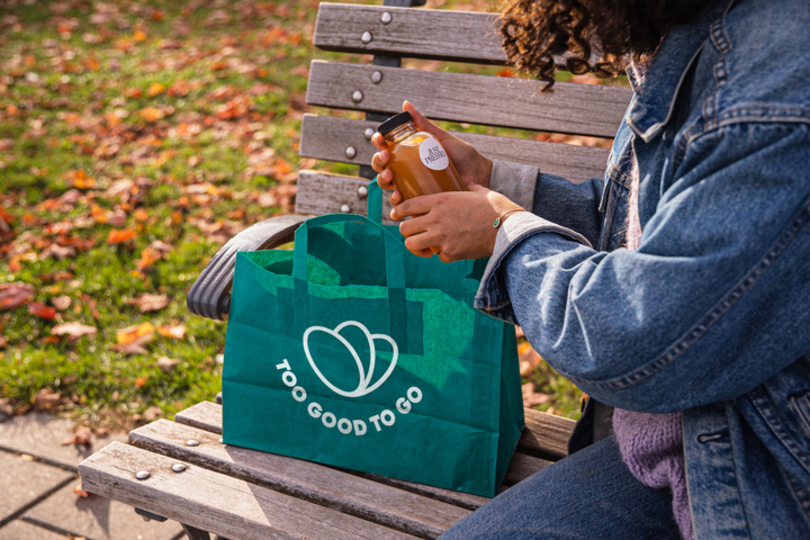Food rescue app ‘Too Good To Go’ reduces food waste in Syracuse area

With the ‘Too Good To Go’ service app’s release, Syracuse residents have access to discounted meals and groceries. App operators say they’re eager to expand their mission to Syracuse with goals to reduce food waste and help the environment. Courtesy of Allie Denburg
Get the latest Syracuse news delivered right to your inbox.
Subscribe to our newsletter here.
When Purple Banana owner Luke Nicolette heard about the Too Good To Go app, he said joining was a “no-brainer.” Food waste at his business has been a constant issue, he said, and the service allowing him to cut down on waste and appeal to a new demographic was a “perfect fit.”
The Too Good to Go app recently added the city of Syracuse as a new service area, giving residents access to locally discounted restaurants and grocery stores. The food rescue company plans to expand its mission in Syracuse to reduce food waste and help the environment.
“In the business world, there’s a lot of transactional things where someone’s gained and someone’s lost,” Nicolette said. “This is a win-win. The customer wins, we help eliminate waste.”
Launched in late August, Syracuse was one of several cities in central New York added to the app, including Albany, Buffalo and Rochester. Allie Denburg, associate director of strategy and operations at TGTG, said they are “super excited” to officially be in Syracuse.
On the app, users select an establishment to reserve a “surprise bag” containing restaurants’ unsold food at a 25-50% discount, according to its website.
“We know that the city has a distinctive local food culture and a large student population, so Too Good To Go is a great opportunity for us to expand our impact and our access in terms of students,” Denburg said.
Denburg said TGTG has partnered with over 80 stores in the city so far, including Pavone’s Pizza & Eatery, Wings in Cuse, Lombardi’s Imports, Kofta Burger, Sugar Grove, Purple Banana and Las Delicias.
The company uses surprise bags because of the unpredictability of food waste, Denburg said. Through their service, TGTG allows leftover fresh food to be sold at the end of the day instead of thrown out.
In the weeks since its opening, Denburg says the app has saved over 6,000 meals from going to waste in the Syracuse area, and the team is in the process of getting more partners on the platform.
In 2022, the United Nations Environment Programme estimated 1.05 billion tonnes of globally generated food waste.
TGTG’s website cites Project Drawdown (2020), which reports reducing food waste as the number one action individuals can take to help fight climate change. TGTG’s food conservation efforts have avoided 1.1M tons of CO2e emissions.
Food that ends up in landfills decomposes without oxygen, producing methane, a “potent” greenhouse gas, said a representative from the New York State Department of Environmental Conservation in a statement to The Daily Orange.
“Landfilled food waste also contributes to more leachate produced and represents a massive loss of resources: wasting the energy, water, fertilizer, and labor that went into producing, processing, and transporting that food in the first place,” the statement reads.
The agency said that reducing food waste from restaurants cuts methane emissions from landfills, extends landfill capacity and saves the energy, water and labor invested in producing that food.
The NYDEC wrote that food redistribution platforms could “complement” the work of regional food banks and other emergency food relief organizations rather than “replace” them.
Jullen Merrill, owner and chef of Kofta Burger, raised concerns about the app potentially being a “Catch-22” in terms of sustainability. At his business, he’s seen a decrease in food waste, but Merrill said he’s aware that grocery stores using the app have increased their plastic packaging.
Denburg says TGTG partners choose how they want to handle packaging. Stores can either provide the packaging or some request users bring their own containers. Some coffee shops even recommend bringing a thermos for coffee.
In addition to environmental efforts, Denburg said the app creates higher “foot traffic” to local businesses, as users have to go in-store to pick up their orders rather than use a delivery service.
Merrill said that aspect has “the biggest benefit” for Kofta as it has received several new customers who weren’t aware of the restaurant before the app.
Nicolette said Purple Banana is “willing to grow with the community and students” to help generate more TGTG surprise bags. He explained that, while testing out new recipes, there’s a lot of wasted food involved, and now he feels “inclined” to come up with more recipes to create more available food for orders.
“We’re an active participant, and we are also willing to grow our Too Good To Go clientele with the community,” Nicolette said.
Denburg said TGTG is interested in potentially working with Syracuse University’s dining services. She said food insecurity is a big issue on college campuses, as 23% of undergraduate students nationally face food insecurity, according to the National Postsecondary Student Aid Study.
“We’re just scratching the surface, and I think there’s a huge opportunity to save a lot more meals,” Denburg said.






